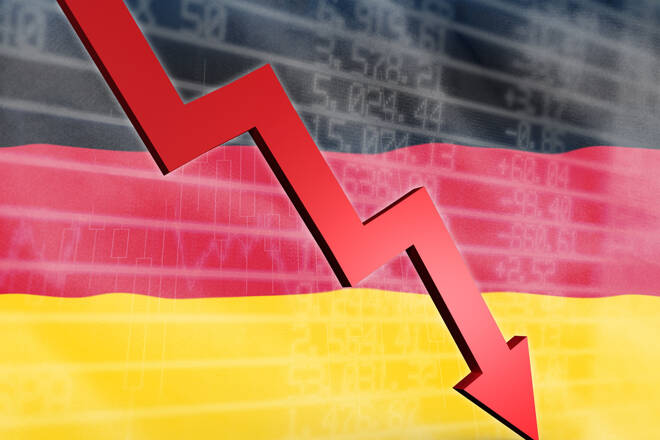Advertisement
Advertisement
European Equities: A Week in Review – 18/02/22
By:
The European equity markets saw deep red in the week, weighed by the threat of Russia invading the Ukraine. Geopolitics will remain key in the week ahead.
The Majors
It was a particularly bearish week for the European majors in the week ending 18th February. The DAX slid by 2.48%, with the CAC40 and the EuroStoxx600 ending the week down by 1.17% and by 1.87% respectively.
A busier Eurozone economic calendar failed to impress, with a mixed set of numbers from the U.S also providing little support. A less hawkish FOMC meeting minutes was market positive, but not enough to shake market jitters over Russia and the Ukraine. Throughout the week, the continued threat of Russia invading the Ukraine left the majors in the red.
The Stats
Economic sentiment figures for Germany and the Eurozone and Eurozone GDP numbers were key early in the week.
It was a mixed set of numbers. While 4th quarter GDP numbers were in line with 1st estimates for the Eurozone, economic sentiment figures disappointed. Germany’s ZEW Economic Sentiment Index rose from 51.7 to 54.3, while the Eurozone’s fell from 49.4 to 48.6.
Other stats for the Eurozone were mixed, however, supporting the ECB’s view on the economy at the turn of the year.
Industrial production rose by a further 1.2% off the back of a 2.4% increase in November. The Eurozone’s trade deficit widened, however, as supply chain constraints weighed. In December, the Eurozone’s trade deficit widened from €1.5bn to €4.6bn.
From the U.S
Wholesale inflation and retail sales figures drew plenty of attention in the 1st half of the week. The numbers were positive, supporting the FED’s stance on monetary policy.
In spite of rising consumer prices, retail sales jumped by 3.8% in January, reversing a 2.5% decline from December. Wholesale inflationary pressures were also on the rise, with the producer price index increasing by 1.0% in January. The index had risen by a more modest 0.4% in December.
In the 2nd half of the week, jobless claims were key. In the week ending 11th January, initial jobless claims climbed from 225k to 248k. The numbers were not weak enough to derail FED rate hike plans.
On the monetary policy front, the FOMC meeting minutes were also key. The minutes revealed that members were willing to consider rate hikes on a meeting-by-meeting basis instead of inking in rate hikes through H1. The minutes were considered more dovish than anticipated, providing some support to riskier assets
The Market Movers
From the DAX, it was a mixed week for the auto sector. Volkswagen slid by 4.53%, with Continental ending the week down by 2.45%. BMW and Daimler ended the week up by 0.27% and by 1.54% respectively, however.
It was also a mixed week for the banking sector. Deutsche Bank slid by 5.38%, while Commerzbank rose by 4.54%.
From the CAC, it was a bearish week for the banks. Soc Gen tumbled by 10.01%, with BNP Paribas and Credit Agricole ending the week with losses of 4.59% and 7.11% respectively.
The French auto sector had a mixed week. Stellantis NV slipped by 0.76%, while Renault rose by 1.09%.
Air France-KLM ended the week down by 7.98%, with Airbus falling by 2.95%.
On the VIX Index
It was a 2nd consecutive week in the green for the VIX in the week ending 18th February, marking a 3rd rise in 6 weeks.
Following a 17.83% jump from the previous week, the VIX rose by 1.43% to end the week at 27.75.
2-days in the green from 5 sessions, which included a 15.73% surge on Thursday delivered the upside.
For the week, the S&P500 slid by 3.45%, with the Dow and the NASDAQ ending the week down by 1.90% and by 1.76% respectively.
The Week Ahead
It’s busy week ahead on the Eurozone economic calendar. Early in the week, prelim private sector PMIs for France, Germany, and the Eurozone will draw plenty of interest. Following disappointing numbers from January, the markets will be looking for private sector activity to pick up in February. German business and consumer sentiment figures due out mid-week will also provide direction.
At the end of the week, 4th quarter GDP numbers for France and Germany will also influence.
From the U.S, private sector PMIs and consumer confidence will be key early on the week. On Thursday, 4th quarter GDP and jobless claims figures will also draw interest ahead of a busy Friday. At the end of the week, personal spending, inflation, and core durable goods orders wraps things up.
Away from the economic calendar, geopolitics will remain a key driver, however. Expect news updates from Eastern Europe and chatter from Capitol Hill to mute the effect of economic data in the week.
About the Author
Bob Masonauthor
With over 28 years of experience in the financial industry, Bob has worked with various global rating agencies and multinational banks. Currently he is covering currencies, commodities, alternative asset classes and global equities, focusing mostly on European and Asian markets.
Advertisement
